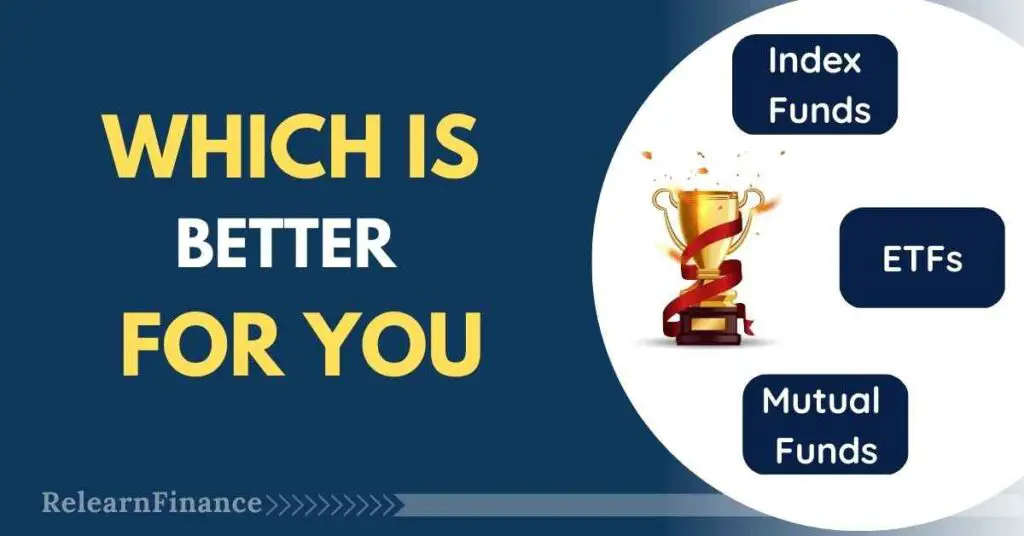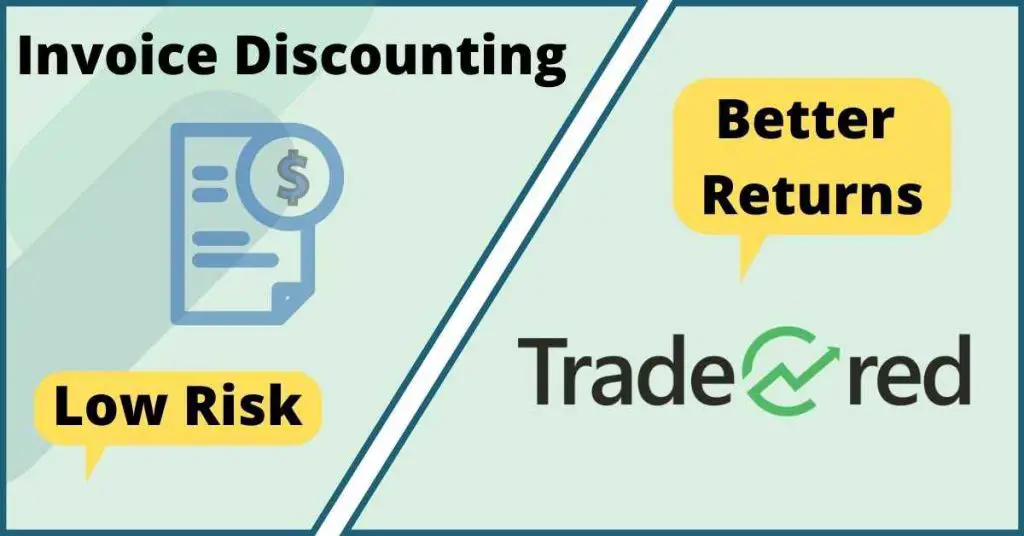Learn the difference between ETF vs index funds vs mutual funds. The pros and cons of each so you can make the best decision for your portfolio.
We all know that India is on a growth trajectory, and it makes the most sense to keep investing for the long term.
Everyone cannot actively research, pick stocks and invest.
There are various ways to passively invest in the stock market through mutual funds, ETFs, or Index funds.
All of these are good investments in the long term, but which one is better in what kind of conditions?
Index funds and ETFs are low-cost, but does that mean you should not invest in mutual funds?
What is better between Index funds and ETFs?
Actually, every investment has different use cases; some might fit in one but not in the other.
So in this post, let’s discuss the differences, uses, and future of ETF vs Index Funds vs Mutual Funds.
What are Exchange Traded Funds (ETFs)

ETFs lie somewhere in between stocks and mutual funds.
Like Index mutual funds ETFs too follow an Index which means it tracks and buy selling as same as Index funds.
A NIFTY 50 ETF will follow the companies in NIFTY 50 and maintain the same proportion and quantity of stocks as in NIFTY 50.
Difference between ETFs vs Index Funds
The difference between ETFs and Index funds is in their trading styles.
In Index mutual funds, as investors invest, the AUM size keeps increasing, whereas in ETFs, an NFO is launched and its units are distributed among the NFO investors.
Now, these ETF units can be traded on an exchange like normal stocks, and investors buy and sell these units.
In the case of ETFs, the cost or fee is lower than that of Index funds and can go as low as 0.01%.
Advantages of ETFs
- Low expense ratios
- Tax efficiency
- Flexibility in trading
Disadvantages of ETFs
- Commission fees for buying and selling
- Risk of tracking error
- Limited diversification
What are Index funds and Passive Mutual Funds?

Index funds, or passive mutual funds, are the funds that follow an index like the NIFTY 50 or SENSEX.
Their target is not to beat the index but to follow it and generate almost the same return as the index itself.
An index fund contains all and only the stocks that are included in the index and are in exactly the same proportion and quantity.
Index funds can vary greatly depending on which indices they track, such as the BANK NIFTY, NIFTY IT, and NIFTY NEXT 50.
Do Index funds outperform mutual funds?
Here you can ask questions like, “Why invest in an Index fund if it cannot beat the index?”.
The answer lies in the historic data.
If you look at past performance, 80% of active large-cap funds struggle to beat benchmarks.
Therefore, it doesn’t make sense for investors to invest in active funds charging 1-2% expense ratios.
The expense ratio of passive or index funds can be between 0.1% and 0.3%, which is very low compared to active funds.
Advantages of index funds
- Low expense ratios
- Passive management
- Diversification
Disadvantages of index funds
- No opportunity for active management
- Tracking error
- Potential liquidity issues
What are Active Mutual Funds?
As you know, mutual funds are a way to invest in stocks indirectly without doing research and analysis by yourself but leverage the expertise of fund managers.
Mutual funds also help diversify investments across multiple companies, sectors, or countries.
In active mutual funds, the fund manager actively tracks the company’s technical and fundamentals.
The fund manager makes active buy and sell decisions based on their research and understanding.
The primary goal of an active mutual fund is to outperform the returns of a benchmark index, such as the NIFTY 50 for large-cap mutual funds.
So the target of large-cap mutual funds is to generate higher returns than the NIFTY 50.
Advantages of mutual funds
- Professional management
- Diversification
- Liquidity
Disadvantages of mutual funds
- High expense ratios
- Potential tax inefficiency
- Limited flexibility in trading
ETF vs Index Funds vs Mutual Funds
| ETFs | Index Funds | Mutual Funds | |
| Trading Style | Traded the same as stocks, so the price changes in real time depending on buying and selling. | Unit => NAV, which is updated after trading hours. | Unit => NAV, which is updated after trading hours. |
| Intraday Trading | Yes | NA | NA |
| Management | Passive | Passive | Active |
| Expense Ratio | Low(lowest 0.01%) | Medium(lowest 0.2%) | Higher(1-2%) |
| Demat A/c | Yes | No | No |
| Liquidity | Low | High | High |
| Efforts Needed | Some | No | No |
| Best For | Large Cap | Large Cap | Small & Mid Cap |
Which is better ETF vs Index Funds vs Mutual Funds
So finally, which is better for you to invest in?
Cost-wise, ETFs look better, but the problem is the low liquidity; however, liquidity has been continuously increasing in the past few years and looks to improve further.
For a beginner, it is better to invest in Index mutual fund if you want to choose between ETFs and Index funds.
As knowledge and liquidity increase, you can slowly move towards ETFs.
Now, whether to invest in an active or passive mutual fund.
In large-cap mutual funds, where beating index funds is becoming difficult, it makes sense to invest in passive funds with a low cost.
However, there is still scope for active funds to beat small-cap or mid-cap indexes for small-cap and mid-cap investing, so active mutual fund investing is still beneficial.
Conclusion
ETFs, index funds, and mutual funds all have their own unique PROS and CONS.
One offers low expense ratios but might have the risk of tracking error or limited diversification.
Other approaches offer passive management but have high expense ratios.
Therefore, when deciding which type to invest in, it’s important to consider your individual investment goals and risk tolerance.
Also, you can try to diversify your portfolio by investing in a combination of investments.
Ultimately, it’s important to make informed decisions, which is the goal of this article.
FAQs
Is it ok to only invest in Index funds?
Yes, it’s absolutely fine to invest in Index funds. If you believe in India’s growth over the long term and want to benefit from it, then you should at least invest in an Index fund.
Investing passively saves you time from doing stock analysis and research and allows you to concentrate on your primary job.
Can Index funds ever crash?
Index funds are collections of stocks, and if the stock market crashes, it leads to Index funds crashing too.
Can you be rich with Index funds?
The definition of rich is different for different people. Index funds in India usually gave a return between 12-14% over a long period.
You can calculate this according to your wealth number and the amount you can invest monthly.
For context, if being a crorepati is rich for you, then investing ₹10,000 per month for 20 years can make you a crorepati.
Do Exchange Traded Funds pay dividends?
Yes, ETFs may pay dividends either in the form of cash or may reinvest the dividends into the ETFs.
Can I invest in ETF through SIP?
ETFs are more like buying units of stocks trading on the stock exchange, and it’s possible that your broker doesn’t provide a SIP feature for ETF investing.
In this case, SIP through an Index mutual fund is a better option.
Disclosure: Please note that some links on relearnfinance.com are affiliate links. We may receive a commission at no extra cost to you if you click through our links and make a purchase from our partners.



